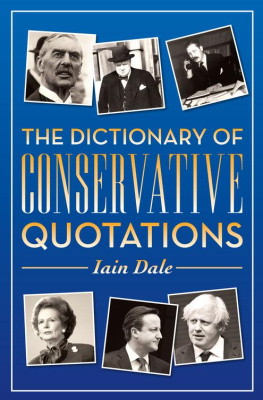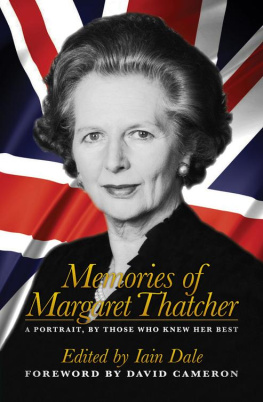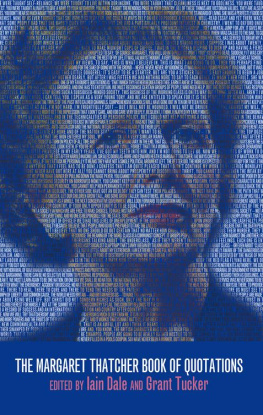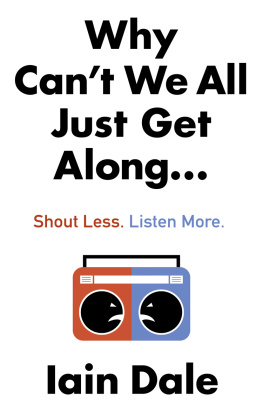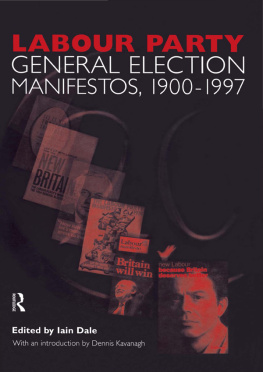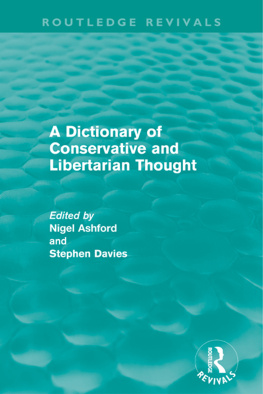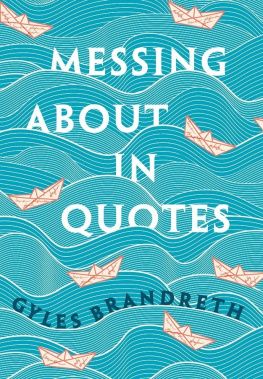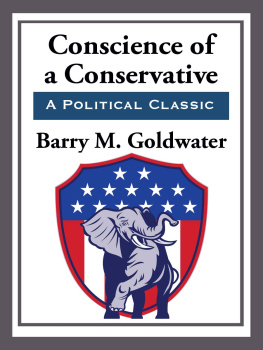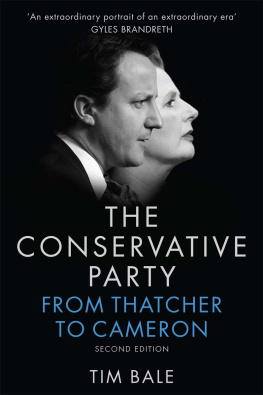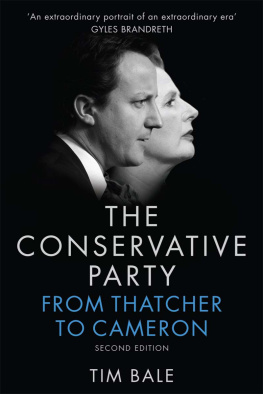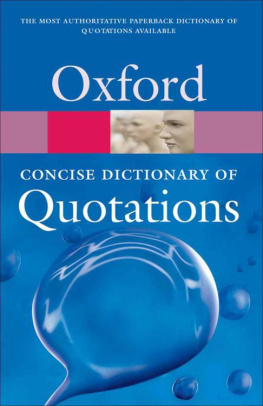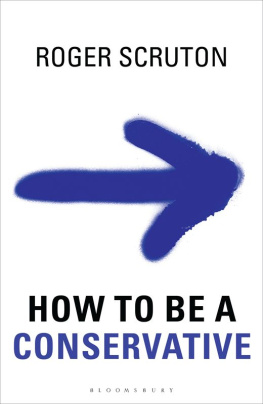by the Rt Hon. William Hague
W hen Conservative Prime Minister Benjamin Disraeli commented that, The wisdom of the wise and the experience of the ages are perpetuated by quotations, he was, more than likely, envisaging a collection selected from his own prodigious output. It is true, however, that dictionaries of historical quotations are an ideal way to discover the personalities which have dominated our political landscape, both past and present. To know that Burke is an important conservative thinker is not the same as understanding what he meant by saying: Liberty must be limited in order to be possessed.
Quotations allow those of us who do not have time to pore over multiple learned tomes to access the thoughts of many brilliant, important, observant or just plain eccentric minds and to learn how the world looked through their eyes.
In the often frenzied environment that the modern politician inhabits, crammed with back-to-back appointments and three-minute interviews, it is hard to remember that words are never entirely spontaneous or disposable. Like particles of pure energy, words assume many different forms and can be turned to suit any purpose the moment demands, yet, as a consequence of being drawn on time and again, they accumulate their own histories and a wide range of meanings.
A word like conservative has been around long enough for people to understand very different things by it just ask Edward Heath or Margaret Thatcher! Occasionally, famous quotations will be rewarded by inclusion in popular idiom. Harold Macmillans comment about the wind of change in South Africa is an obvious example. Most political words will, it is true, be quickly forgotten but all remain available to be excavated and rediscovered by future generations. Dictionaries of quotations are, in many respects, exercises in political archaeology.
What is particularly pleasing to me about a specialist Conservative dictionary of quotations is how it illustrates the breadth and depth of conservatism as a political tradition. Indeed, it has a proud pedigree, counting among its numbers thinkers of the calibre of John Locke, Edmund Burke and Michael Oakeshott; great wartime leaders, including Pitt the Younger and Winston Churchill; radical economic reformers like Robert Peel and Margaret Thatcher, and oratorical geniuses such as the Elder Pitt and Ronald Reagan. Less eminent, although no less conservative, are colourful characters like Edwina Currie, the might-have-beens like Barry Goldwater, or the forgotten who can recall the key events of Henry Addingtons premiership? Finally, there are those, like Alan Clark, whose wit can be savage but who can make us laugh.
What, if anything, do these conservative figures have in common? In consulting quotations from Aristotle (we claim him!) to Margaret Thatcher, from Abraham Lincoln to Karl Popper, certain themes recur: a suspicion of state intervention; an admiration for the traditional institutions of social and political life and a belief in the virtue of individual liberty so far as it does not undermine these institutions. The pleasure of a book such as this lies in exploring the diversity of ways in which Conservatives have thought about these and a vast array of other questions. I certainly do not agree with all of the quotations in this book. Some, such as Abraham Lincolns views on race before he became President, make for quite difficult reading. Conservatives, unfortunately, are no different from other kinds of people in falling prey to the prejudices of the day. They are perhaps a little better than some at maintaining a healthy scepticism towards passing political fads.
Any political organisation as old as the Conservative Party inevitably has its historical fault lines. The modern party which, to use John Majors words, believes in a classless society, was once led by Lord Salisbury, to whom democracy meant simple despotism. Neither have Tories always been advocates of free trade, as Robert Peel learned to his cost.
Whatever the particular view expressed, I like to think that, on the whole, the quotations in this book show that conservatism is a political tradition alive with ideas and enriched by many thoughtful, intelligent and funny people. I cant deny that sometimes they have got it wrong, but I still have no doubt in saying that were Disraeli alive today, he would amend one of his quotations to read: The wisdom of the wise and the experience of the ages are perpetuated by Conservative quotations!
William Hague
Leader of the Conservative Party 19972001, Foreign Secretary 2010
by Iain Dale
T his book has been an absolute pleasure to compile. One cannot fail to learn from the words of wisdom or fail to be amused, entertained or informed. But the trouble with compiling a book of quotations is that one inevitably leaves out some obvious favourites. I am sure I have been guilty of that in this volume. Quotations have fascinated me all my adult life. Whether writing articles or making speeches they are invaluable for politicians of every hue.
I have purposely omitted quotes by non-conservative politicians on their criticism or definition of Conservatism. If you have enjoyed this volume but know of quotations you think should have been included, please feel free to get in touch by email iain@iaindale.com as we intend to publish new editions of this book in the future.
The quotes have been selected according to a number of criteria but, as with all books of quotations, the selection is somewhat coloured by my own choices. Where possible I have included the subjects biographical details. Please forgive any omissions or feel free to send me corrections. It has not been possible to source every quote, but in my view it is better to include a good quote than exclude it purely on the basis of lack of provenance. No doubt some quotations may have been attributed wrongly or have been printed in a slightly different form to the original. No doubt readers may puzzle over the exclusion of a particular favourite quotation. Please feel free to write to me with any corrections or suggestions for a new edition.
I would like to acknowledge other volumes of quotations which have been especially helpful in compiling this book. They include the Oxford Dictionary of Political Quotations, Right Thinking by Edward Leigh, Andrew Roths Parliamentary Profiles, Scorn and Read My Lips by Matthew Parris among others.
The eagle-eyed reader might spot that I have drawn heavily from my previous book, The Margaret Thatcher Book of Quotations, published by Biteback in 2012. I make no apology for the fact that there are a large number of quotes from Margaret Thatcher and Ronald Reagan. These two politicians shaped the world we live in today, no matter how much others might decry the fact. The world is a safer place and a more prosperous place thanks to them and let us never forget it.
Lastly, I would like to thank Grant Tucker, my executive assistant, for his assistance and enthusiasm in tracking down some elusive quotes. Grant is a mere twenty years old and was born two years after Margaret Thatcher fell from power, yet he seems to know more about her life and achievements than I do. Grant is living proof that Margaret Thatchers legacy will be handed down through the generations.
Iain Dale
August 2013
Earl of Aberdeen
17841860; Prime Minister 185255
I consider war to be the greatest folly, if not the greatest crime, of which a country could be guilty, if lightly entered into. If a proof were wanted of the deep and thorough corruption of human nature, we should find it in the fact that war itself was sometimes justifiable.

